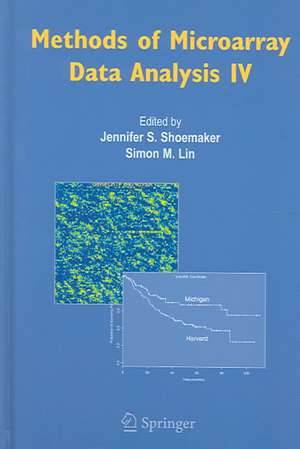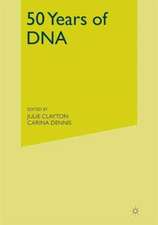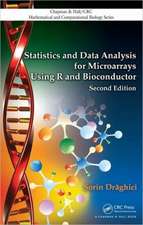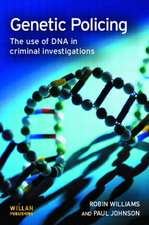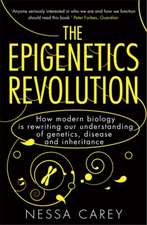Methods of Microarray Data Analysis IV
Editat de Jennifer S. Shoemaker, Simon M. Linen Limba Engleză Hardback – 29 oct 2004
In this volume, four lung cancer data sets are the focus of analysis. We highlight three tutorial papers, including one to assist with a basic understanding of lung cancer, a review of survival analysis in the gene expression literature, and a paper on replication. In addition, 14 papers presented at the conference are included. This book is an excellent reference for academic and industrial researchers who want to keep abreast of the state of the art of microarray data analysis.
Jennifer Shoemaker is a faculty member in the Department of Biostatistics and Bioinformatics and the Director of the Bioinformatics Unit for the Cancer and Leukemia Group B Statistical Center, Duke University Medical Center. Simon Lin is a faculty member in the Department of Biostatistics and Bioinformatics and the Manager of the Duke Bioinformatics Shared Resource, Duke University Medical Center.
| Toate formatele și edițiile | Preț | Express |
|---|---|---|
| Paperback (1) | 714.63 lei 6-8 săpt. | |
| Springer Us – 29 noi 2014 | 714.63 lei 6-8 săpt. | |
| Hardback (1) | 721.77 lei 6-8 săpt. | |
| Springer Us – 29 oct 2004 | 721.77 lei 6-8 săpt. |
Preț: 721.77 lei
Preț vechi: 759.76 lei
-5% Nou
Puncte Express: 1083
Preț estimativ în valută:
138.13€ • 143.68$ • 114.03£
138.13€ • 143.68$ • 114.03£
Carte tipărită la comandă
Livrare economică 15-29 aprilie
Preluare comenzi: 021 569.72.76
Specificații
ISBN-13: 9780387230740
ISBN-10: 0387230742
Pagini: 256
Ilustrații: XVI, 256 p.
Dimensiuni: 155 x 235 x 20 mm
Greutate: 0.57 kg
Ediția:2005
Editura: Springer Us
Colecția Springer
Locul publicării:New York, NY, United States
ISBN-10: 0387230742
Pagini: 256
Ilustrații: XVI, 256 p.
Dimensiuni: 155 x 235 x 20 mm
Greutate: 0.57 kg
Ediția:2005
Editura: Springer Us
Colecția Springer
Locul publicării:New York, NY, United States
Public țintă
ResearchCuprins
Cancer: Clinical Challenges and Opportunities.- Gene Expression Data and Survival Analysis.- The Needed Replicates of Arrays in Microarray Experiments for Reliable Statistical Evaluation.- Pooling Information Across Different Studies and Oligonucleotide Chip Types to Identify Prognostic Genes for Lung Cancer.- Application of Survival and Meta-analysis to Gene Expression Data Combined from Two Studies.- Making Sense of Human Lung Carcinomas Gene Expression Data: Integration and Analysis of Two Affymetrix Platform Experiments.- Entropy and Survival-based Weights to Combine Affymetrix Array Types and Analyze Differential Expression and Survival.- Associating Microarray Data with a Survival Endpoint.- Differential Correlation Detects Complex Associations Between Gene Expression and Clinical Outcomes in Lung Adenocarcinomas.- Probabilistic Lung Cancer Models Conditioned on Gene Expression Microarray Data.- Integration of Microarray Data for a Comparative Study of Classifiers and Identification of Marker Genes.- Use of Micro Array Data via Model-based Classification in the Study and Prediction of Survival from Lung Cancer.- Microarray Data Analysis of Survival Times of Patients with Lung Adenocarcinomas Using ADC and K-Medians Clustering.- Higher Dimensional Approach for Classification of Lung Cancer Microarray Data.- Microarray Data Analysis Using Neural Network Classifiers and Gene Selection Methods.- A Combinatorial Approach to the Analysis of Differential Gene Expression Data.- Genes Associated with Prognosis in Adenocarcinoma Across Studies at Multiple Institutions.
Textul de pe ultima copertă
As studies using microarray technology have evolved, so have the data analysis methods used to analyze these experiments. The CAMDA conference plays a role in this evolving field by providing a forum in which investors can analyze the same data sets using different methods. METHODS OF MICROARRAY DATA ANALYSIS IV is the fourth book in this series, and focuses on the important issue of associating array data with a survival endpoint. Previous books in this series focused on classification (Volume I), pattern recognition (Volume II), and quality control issues (Volume III).
In this volume, four lung cancer data sets are the focus of analysis. We highlight three tutorial papers, including one to assist with a basic understanding of lung cancer, a review of survival analysis in the gene expression literature, and a paper on replication. In addition, 14 papers presented at the conference are included. This book is an excellent reference for academic and industrial researchers who want to keep abreast of the state-of-the-art of microarray data analysis.
Jennifer Shoemaker is a faculty member in the Department of Biostatistics and Bioinformatics and the Director of the Bioinformatics Unit for the Cancer and Leukemia Group B Statistical Center, Duke University Medical Center. Simon Lin is a faculty member in the Department of Biostatistics and Bioinformatics and the Manager of the Duke Bioinformatics Shared Resource, Duke University Medical Center.
In this volume, four lung cancer data sets are the focus of analysis. We highlight three tutorial papers, including one to assist with a basic understanding of lung cancer, a review of survival analysis in the gene expression literature, and a paper on replication. In addition, 14 papers presented at the conference are included. This book is an excellent reference for academic and industrial researchers who want to keep abreast of the state-of-the-art of microarray data analysis.
Jennifer Shoemaker is a faculty member in the Department of Biostatistics and Bioinformatics and the Director of the Bioinformatics Unit for the Cancer and Leukemia Group B Statistical Center, Duke University Medical Center. Simon Lin is a faculty member in the Department of Biostatistics and Bioinformatics and the Manager of the Duke Bioinformatics Shared Resource, Duke University Medical Center.
Caracteristici
In a single reference, the reader can learn about the most up-to-date methods on associating microarray data with a survival endpoint All papers included in the publication analyze the same data sets Thus, the audience should benefit from the critical evaluation of various techniques A reference not only for academic and industrial researchers, but also for core bioinformatics/genomics courses Includes supplementary material: sn.pub/extras
